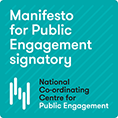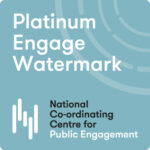
About our public engagement
What is public engagement?
The National Coordinating Centre for Public Engagement (NCCPE) defines public engagement as the following:
“Public engagement describes the many ways in which the activity and benefits of higher education and research can be shared with the public. Engagement is by definition a two-way process, involving interaction and listening, with the goal of generating mutual benefit.”
Why does public engagement matter to us?
 We have signed the NCCPE Manifesto for Public Engagement, which outlines the principles that support a positive culture for public engagement. This is realised through our research, teaching and learning and wider social responsibility work.
We have signed the NCCPE Manifesto for Public Engagement, which outlines the principles that support a positive culture for public engagement. This is realised through our research, teaching and learning and wider social responsibility work.
How do we do public engagement at Manchester?
Public engagement is how we share ideas and research; inspire discussion, debate and creativity; and involve the public in our work.
Our commitment to public engagement is reflected in our institutional strategy – Our Future (2020-2025) – and is supported by our unique strategic goal of social responsibility, which is in every aspect of our work, teaching, research and wider contribution to society.
We’re recognised locally, nationally and internationally for our collaborative, inclusive and reflective engagement practice, and our purposeful approaches to address societal challenges – listening to and working in partnership with diverse communities.
 In 2023, we were awarded a Platinum Engage Watermark from the NCCPE, which recognises “exceptional strategic leadership of public engagement, high standards of professional support and excellence in partnership working”.
In 2023, we were awarded a Platinum Engage Watermark from the NCCPE, which recognises “exceptional strategic leadership of public engagement, high standards of professional support and excellence in partnership working”.
Our commitment to and support for public engagement is recognised through Research England’s Knowledge Exchange Framework (KEF) where we achieved the highest possible score for our public and community engagement and the annual Times Higher Education Impact Ranking, which provides global benchmarks across the 17 UN Sustainable Development Goals.
Public engagement with purpose
As an engaged university, we’re committed to embedding public engagement into all aspects of our work.
- Engaged research: We actively work with and involve the public in our research activity. We recognise that diverse forms of knowledge, expertise and skills alongside the value of sharing and building knowledge in partnership with different communities helps to make our research meaningful, relevant and impactful.
- Engaged teaching: We develop teaching and learning opportunities that both make a positive difference to our communities as well as enhance the educational practice and experience of our students.
- Engaged places: We connect our public engagement work to people and partners locally, nationally and globally through our research, teaching and social responsibility activities. Our cultural institutions provide distinctive places of belonging for our local communities
We purposefully engage with diverse audiences and community partners to meet identified needs, and our engagement activities are underpinned by key principles of partnership, collaboration, inclusion and reflection.
How do we support public engagement at Manchester?
 Many funders expect researchers to engage with the public – seeing public engagement as a route to impact in research grants and as a demonstration of impact in the Research Excellence Framework (REF). We also demonstrate our public and community engagement impact through the Knowledge Exchange Framework (KEF).
Many funders expect researchers to engage with the public – seeing public engagement as a route to impact in research grants and as a demonstration of impact in the Research Excellence Framework (REF). We also demonstrate our public and community engagement impact through the Knowledge Exchange Framework (KEF).
As Academic Lead for Public Engagement, Professor Stephanie Snow oversees the development, implementation and monitoring of an institutional framework for public engagement in parallel with other key university-wide strategies.
In 2022-2023 we used the NCCPE EDGE tool to map our existing strengths and weaknesses for the University’s work in public engagement, and refreshed our Public Engagement Framework (PDF), which sets out our structures and governance, and priorities for supporting high quality engagement. Alongside our own internal review we took part in the NCCPE Watermark process – resulting in a Platinum award.
Additionally, our civic engagement activities reflect how our work is enhanced and inspired by our location in Greater Manchester and the way we improve lives across our city and region. We are also piloting new approaches to partnerships and deliberative listening through our Greater Manchester Universities’ Citizens’ Panel to seek feedback and understand the needs and priorities of local citizens.
See more of our work on public engagement in our directory of activities.
